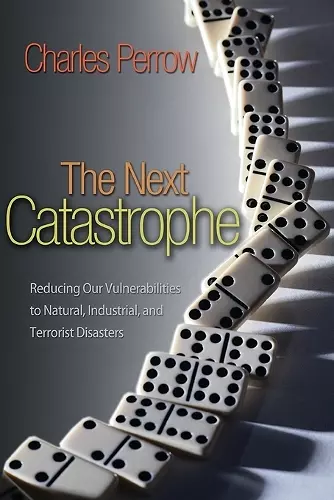The Next Catastrophe
Reducing Our Vulnerabilities to Natural, Industrial, and Terrorist Disasters
Format:Paperback
Publisher:Princeton University Press
Published:11th Mar '11
Currently unavailable, and unfortunately no date known when it will be back

Charles Perrow is famous worldwide for his ideas about normal accidents, the notion that multiple and unexpected failures--catastrophes waiting to happen--are built into our society's complex systems. In The Next Catastrophe, he offers crucial insights into how to make us safer, proposing a bold new way of thinking about disaster preparedness. Perrow argues that rather than laying exclusive emphasis on protecting targets, we should reduce their size to minimize damage and diminish their attractiveness to terrorists. He focuses on three causes of disaster--natural, organizational, and deliberate--and shows that our best hope lies in the deconcentration of high-risk populations, corporate power, and critical infrastructures such as electric energy, computer systems, and the chemical and food industries. Perrow reveals how the threat of catastrophe is on the rise, whether from terrorism, natural disasters, or industrial accidents. Along the way, he gives us the first comprehensive history of FEMA and the Department of Homeland Security and examines why these agencies are so ill equipped to protect us. The Next Catastrophe is a penetrating reassessment of the very real dangers we face today and what we must do to confront them. Written in a highly accessible style by a renowned systems-behavior expert, this book is essential reading for the twenty-first century. The events of September 11 and Hurricane Katrina--and the devastating human toll they wrought--were only the beginning. When the next big disaster comes, will we be ready? In a new preface to the paperback edition, Perrow examines the recent (and ongoing) catastrophes of the financial crisis, the BP oil spill, and global warming.
One of Choice's Outstanding Academic Titles for 2007 "[Perrow's] 1984 book Normal Accidents and his many publications analyzing how and why technological systems are vulnerable to disaster have achieved iconic status. In The Next Catastrophe, Perrow extends his analysis to incorporate 'natural' disasters and terrorism more fully."--American Prospect "Perrow amply describes the failure of governmental agencies to anticipate, plan for and effectively respond to a whole series of very serious threats to our well being, if not to our very survival... This is a sobering book. If enough people hear Perrow's message, the future might be ever so slightly less catastrophic."--Social Forces "The threefold demographic vulnerabilities to disasters [described by Perrow] are well stated and merit continuing attention from scientists, engineers, emergency management practitioners, and policy makers."--American Journal of Sociology "This book proposes a bold new way of thinking about disaster preparedness...Focusing on three causes of disaster--natural, organizational, and deliberate--he shows that our best hope lies in the deconcentration of high-risk populations, corporate power, and critical infrastructures. He also provides the first comprehensive history of the Federal Emergency Management Agency (FEMA) and the Department of Homeland Security (DHS) and examines why these agencies are so ill equipped to protect U.S. citizens."--Natural Hazards Observer "Hurricane Katrina and the 9/11 attacks have exposed the U.S.'s vulnerabilities to natural and unnatural disasters. What should be done to prevent such catastrophes in the future? Acclaimed sociologist and systems analyst Perrow, addresses this question...The book is written in a highly readable prose that is accessible to general audiences. Indispensable for undergraduate/graduate collections in disaster management studies and risk assessment studies, and extremely useful for environmental studies and environmental sociology."--T. Niazi, Choice "The Next Catastrophe is an important and far-reaching book that, in arguing for the reduction of vulnerabilities in critical infrastructure to natural, industrial, and terrorist disasters, tackles issues of high significance to us all. It must be hoped that the readership of this book includes not only researchers and industrial safety practitioners but also executives along with politicians at all levels and that its message is acted upon."--David M. Clarke, Risk Analysis
- Short-listed for Choice Magazine Outstanding Reference/Academic Book Award 2007
ISBN: 9780691150161
Dimensions: unknown
Weight: 595g
432 pages
Revised edition